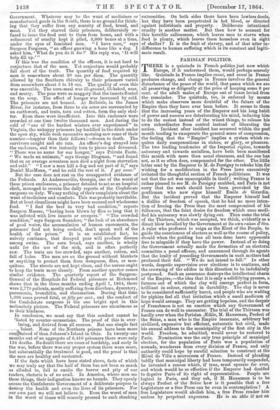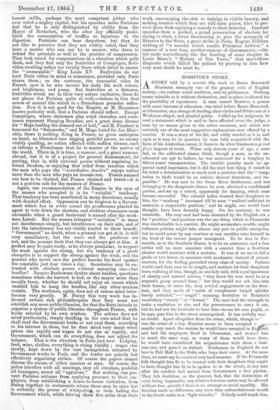PARISIAN POLITICS. T HERE is a quietude in French politics just
now which Europe, if it understood them, would perhaps scarcely like. Quietude in France implies ennui, and ennui in France produces change, and change in France involves the general disturbance of the peace of the world, that peace which we are all preserving so diligently at the price of keeping some 8 per cent. of the adult males of Europe out of taxes levied from the remainder. The quietude, too, is enforced by means which make observers more doubtful of the future of the Empire than they have ever been before. It seems to them that the increasing years of the Emperor and his long habit of power and success are deteriorating his blind, inducing him to do the easiest instead of the wisest things, to release his own subordinates from control instead of liberating the nation. Incident after incident has occurred within the past month tending to exasperate the general sense of compression, the feeling that the "Empire" implies a system which re- quires daily compensations in riches, or glory, or pleasure. The two leading tendencies of the Imperial rigime, towards autocracy and towards socialism, have both been manifested this month with more than usual clearness, and the one has not, as it so often does, compensated for the other. The little letter sent by the Emperor to M. de Persigny to rebuke him for wishing for a modification in the Press laws excessively irritated the thoughtful section of French politicians. It was not that the act was unacceptable in itself; writing France is rather pleased to see M. de Persigny snubbed, and Paris is not sorry that the snub should have been provoked by the gentleman who now signs himself Emile de Girardin. But the incident proved that the Emperor himself had a dislike of freedom of speech, that he had no more inten- tion of freeing the Press than the most compromised of his followers, that the faint desire for freedom which once modi- fied his autocracy was slowly dying out. Then mune the trial of the Thirteen, which was accepted, we think, evidently as a direct blow levelled by the Government at its own raison d'être. A ruler who professes to reign as the Elect of the People, to g.uide the consciences of electors as well as the course of policy, should when the guiding has all been done leave opponents free to misguide if they have the power. Instead of so doing the Government actually made the formation of an electoral committee a penal offence, and announced through its agents that the lenity of preceding Governments in such matters had produced their fall. "We do not intend to fall." In other words, despotic supervision over elections is to continue, and the crowning of the edifice in this direction to be indefinitely postponed. Such an assurance destroys the intellectual charm of the Empire,—the idea that it is only a solidifying process, a furnace out of which the clay will emerge perfect in form, brilliant in colour, eternal in durability. The clay is never to be considered sufficiently burnt, and people who are waiting for pipkins feel all that irritation which a small modicum of hope would assuage. They are getting hopeless, and the despair of Frenchmen is not an emotion which any Government of France can do well to encounter. The trial of the Thirteen was hardly over when the Parisian 2Edile, li. Haussman, Prefect of the Seine, a man who is the Empire incarnate, arbitrary but civilized, expensive but efficient, autocratic but civil, made his annual address to the municipality of the first city in the world. Freedom, he admitted, would never be restored to Paris. Nomination was the only true principle of municipal election, for the population of Paris was a population of nomads, wanderers from every division of France, and only authority could hope by careful selection to construct at the H6tel de Ville a microcosm of France. Instead of pleading boldly that municipal liberty had been temporarily suspended, he invented a reason which, if true, must operate for ever, and which would be as effective if the Emperor had decided to deprive Paris of its right of representation. People are logical in Paris, and they ask, if M. Haussman is to be always Prefect of the Seine how is it possible that a free Legislature or a free Press can be even in contemplation ? free Legislature would abolish him, a free Press render him useless by perpetual exposures. He is an able if not an honest redile, perhaps the most competent jobber 'who ever ruled a mighty capital, but his speeches make Parisians feel that he is only distinguished by ability from the Mayor of Rochefort, who the other day officially prohi- bited the consumption of truffles as injurious to the digestion. Parisians can bear despotism, but they do not like to perceive that they are visibly ruled, that they have a master who can say he is master, who dares to defend the principle as well as the practice of compression. They look round for compensations in a situation which galls them, and they find only the festivities of Compiegne, festi- vities recalling rather too vividly those which failed to amuse the " unamusable" King Louis XV.. Festivities do not hurt Paris either in mind or conscience, provided only Paris shares them ; on the contrary, the successful ruler in French eyes is he who invests his daily life with colour, and brightness, and pomp. But festivities at a distance, festivities which are in their very nature exclusive, these do not please the Parisian quite so well,—induce in him that access of mental bile which in a Frenchman precedes reflec- tion. Now it is not good for the Empire, as M. Haussman knows perfectly well, that a Parisian should reflect. Except Compiegne, where statesmen play acted charades, and coun- tesses represent Sleeping Beauties, and a great dame dresses for "Hope leading the damned out of hell," and M. Flaubert is honoured for "Salammbo," and M. Hugo hated for Les Miser- shies' there is nothing doing in France, no great enterprise on hand, no liberated race singing grateful weans, no enemy visibly quailing, no nation affected with sudden tremor, such as informs a Frenchman that he is master of the nerves of the world. There is, it is true' a rumour, and a great rumour, abroad, but it is of a project for general disarmament, for parting, that is, with external power without regaining in- ternal freedom, or enjoying that relief from taxation which the man who pays the "contribution fonciere" enjoys rather more than the man who pays an income-tax. France amused can bear to be chained, but France chained and bored—it is not a position safe for the masters of France.
Again, one recommendation of the Empire in the eyes of the masses who accepted it is its " socialist " tendency. That tendency has been manifested in many directions, usually with decided effect. Oppression can be forgiven to a Govern- ment which has in every conseil des prudhommes planted its agent to vote down the masters, and reckless clearances seem excusable when a grand boulevard is named after the work- man Lenoir. But the masses interpret "socialism" to mean not interference simply, but interference on their side, and of late the interference has not visibly tended to their benefit. "Government" no doubt, when a peasant can get at it, is still very conciliatory, but the mire and the gendarme are not, and the peasant finds that they can always get at him. A prefect may be quite ready, as he always proclaims, to support the weak against the strong, but the tendency of a garde ehampetre is to support the strong against the weak, and the peasant who never sees the prefect knocks his head against the constable just four times a day. Secretaries may be en- trusted with absolute power without annoying one—but beadles ? Jacques Bonhomme doubts about beadles, questions sometimes when the harvest is bad, or the mayor more than usually fussy, whether he should not enjoy an emeute which enabled him to hang the beadles, like any other noxious vermin. The workman, again, does not of course mind inter- ference very greatly. M. Duruy this very week has in- formed certain rich philanthropists that they must not establish any more public libraries, for that the State intends to organize a system of public libraries throughout France, with books selected by its own wisdom. The artizan does not mind particularly, simply deciding in his own mind that he shall read the Government books or not read them, according to his interest in them, but he does mind very much when prices rise rapidly and wages do not rise as rapidly, and Government, which can do everything, does not adjust the balance. That is the situation in Paris just now. Lodging, food, wine, clothes, everything is rising rapidly ; wages rise slowly, kept down by the vast immigration attracted by Government works to Paris, and the trades are quietly but effectively organizing strikes. Of course the papers cannot discuss the claims of either masters or men. Of course the police interfere with all meetings, stop all circulars, prohibit all harangues, arrest all "agitators." But nothing can pre- vent Parisian artizans from applying pressure to their em- ployers, from establishing a honse.to-house visitation, from dining together in restaurants where there may be spies but is certainly the power of whisperingp, or from hating the Government which, while driving them five miles from their
work, encouraging the rich to indulge in visible luxury, and making treaties which they are told raise prices, tries to pre- vent tliem from applying a remedy to their miseries. Insolent speeches from a prefect, a grand prosecution of electors for trying to elect, a letter threatening to give the monopoly of libraries to the State, a great strike in Paris, Eugene Pelletan writing of "a scandal which recalls Petronius Arbiter," a rumour of a new loan, another rumour of disarmament,—the list reads marvelously like the heading of some chapter in Louis Blanc's "History of Ten Years," that marvellous diagnosis which killed the patient by proving to him how very near death he must be.































 Previous page
Previous page